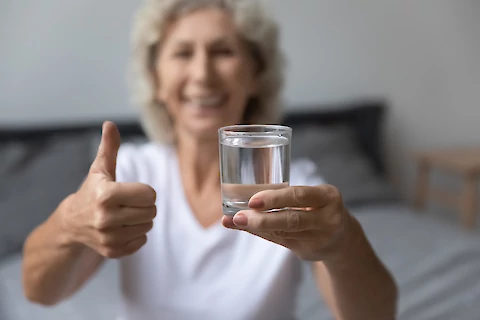
In our golden years, staying hydrated becomes more critical than ever. However, it's a part of our health that’s often overlooked. Some people think that our need for water decreases as we age, but this couldn't be further from the truth! Maintaining proper hydration is crucial for the health and well-being of seniors.
Several myths revolve around hydration in seniors, making it even more challenging to address this critical issue effectively. We will debunk those myths, shed light on the facts, and offer practical tips to ensure our beloved seniors stay well-hydrated.
The Aging Process and Hydration
As we age, our body undergoes various changes, and one of them affects our ability to maintain adequate hydration. The human body's water content decreases with age, making seniors more prone to dehydration. Additionally, the sense of thirst also diminishes as we grow older, which can lead to inadequate water intake. Thus, seniors might not drink enough water, mainly because they don't feel thirsty.
Myths About Hydration in Seniors
One common misconception is that seniors require less water than younger individuals. But the reality is, regardless of age, everyone should aim for at least eight glasses of water daily. Also, as we've just discussed, thirst isn't accurately indicative of hydration levels in seniors. They might not feel thirsty even when their body is dehydrated. Lastly, while all drinks add to the body's fluid intake, some like alcohol and caffeinated beverages can cause dehydration. Consume them in moderation.
The Health Risks of Dehydration in Seniors
Dehydration can pose severe health risks for seniors. Chronic dehydration can lead to a decline in cognitive function, urinary tract infections, kidney stones, and even falls due to dizziness. It's essential to watch for signs of dehydration in seniors, such as dark yellow urine or dry mouth, and ensure they receive enough fluids.
Practical Tips for Ensuring Proper Hydration in Seniors
How can you ensure that your senior loved ones stay hydrated? Encourage them to drink water throughout the day, even if they don't feel thirsty. Adding a slice of lemon or cucumber can make water more appealing. Leaving water bottles around the house where they are easily accessible can also help motivate your senior loved one to drink more. Also, foods with high water content, like fruits and vegetables, can contribute to hydration. Limiting the intake of dehydrating drinks like coffee and alcohol is also vital. Maintaining hydration is not just about increasing water intake. It's also about recognizing the signs of dehydration and taking immediate action.
We Can Help With Hydration
Proper hydration can help you stay healthy, energetic, and mentally sharp. Knowing the myths and facts about hydration can help us take better care of our senior loved ones.
If you live in Logan, Ogden, or Brigham City and need professional help ensuring your loved one's health, don't hesitate to contact us. Our dedicated team is here to assist and provide the highest level of care for your senior loved ones, including helping them stay adequately hydrated.